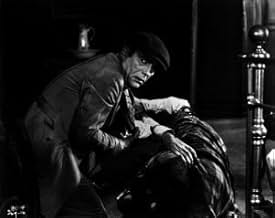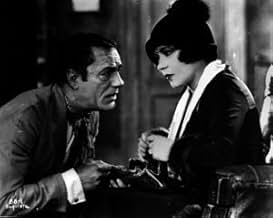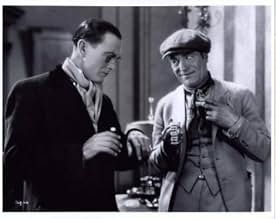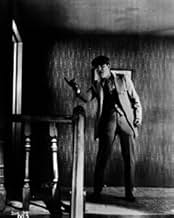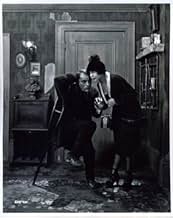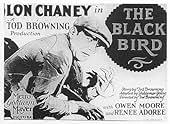Agrega una trama en tu idiomaTwo thieves, the Blackbird and West End Bertie, fall in love with the same girl, a French nightclub performer named Fifi. Each man tries to outdo the other to win her heart.Two thieves, the Blackbird and West End Bertie, fall in love with the same girl, a French nightclub performer named Fifi. Each man tries to outdo the other to win her heart.Two thieves, the Blackbird and West End Bertie, fall in love with the same girl, a French nightclub performer named Fifi. Each man tries to outdo the other to win her heart.
- Dirección
- Guionistas
- Elenco
- Premios
- 1 premio ganado en total
Andy MacLennan
- The Shadow
- (as Andy Maclennan)
Charles Avery
- Music Hall Patron
- (sin créditos)
Lionel Belmore
- Music Hall Proprietor
- (sin créditos)
Margaret Bert
- Minor Role
- (sin créditos)
Peggy Best
- Minor Role
- (sin créditos)
Louise Emmons
- Old Lady at Mission
- (sin créditos)
Willie Fung
- Chinese Man
- (sin créditos)
Fred Gamble
- Man Saying There's a Present for Fifi
- (sin créditos)
Joseph Hazelton
- Man at Table in Music Hall
- (sin créditos)
Cecil Holland
- Old Man at Mission
- (sin créditos)
Bertram Johns
- Member of Bertie's Slumming Party
- (sin créditos)
- Dirección
- Guionistas
- Todo el elenco y el equipo
- Producción, taquilla y más en IMDbPro
Opiniones destacadas
Lon Chaney's twisted performance as the eponymous Blackbird is much fun, as he literally bends himself all out of shape to pretend himself his good, crippled brother, the Bishop. The tortuous melodrama and love triangles of the rest of the film, however, leaves much to be desired. At least, with a Chaney and Tod Browning collaboration, one is bound to be treated to something at least a little offbeat, and such is the case in "The Blackbird," although it doesn't quite reach the level of their better films, such as "The Unholy Three" (1925) and "The Unknown" (1927), although its ironic twist of fate, or double deception, anticipates the latter.
Besides Chaney's physically-demanding dual roles, there are a couple things I appreciate about this one that reinforces his performance. One is the play-within-the-play puppetry. Blackbird's love interest played by Renée Adorée is a vaudeville performer whose face is superimposed over the pliable body of the puppet, the effect not only being actually a film-within-a-film with the multiple-exposure trick--a photographic technique rather than a theatrical one--but also to mirror Chaney's physical transformations. Adorée's stage performance being explicitly a trick calls attention to the doubled deception supposedly off-stage by Chaney--that of his fooling fellow characters and that of the few moments on screen where he doesn't share the deception with the spectator. Even though the photoplay spends too much time on Chaney and the rest lounging about at the club's bar doing not much of anything and even taking time out for Blackbird to intimidate an interracial couple and for a couple of intertitles to include a racial slur against Chinese characters, I do appreciate the reflexivity of the play-within-play, or film-within-film puppetry.
The other interesting aspect is Owen Moore's character. Whereas Chaney's Blackbird/Bishop continues a charade, including going in and out of his room to change personas as if anticipating Clark Kent going into phone booths to reveal his Superman costume, to maintain his "true identity" as a lowly thief by the protection of his respectable alter ego, Moore's "West End Bertie" has completely adopted his respectable persona as a dandy while still carrying out thefts--and, more than that, he exploits the character for the purpose of stealing from his upper-class acquaintances. The love triangle stuff is bland, especially when an old lover of Blackbird's is thrown in the mix, but the initial fascination and rivalry expressed by Chaney when Moore's character is fully revealed to him is compelling.
If one gets past some particularly bad pacing and overdone melodrama for this Browning-Chaney collaboration, or that Adorée's performer turns out to be disappointingly featherbrained and Moore's monocle-wearing dandy none too interesting, either, after his initial confrontation with Chaney's Blackbird, there's clever, reflexive play going on here. On stage in the puppetry and off-stage in the criminal deception and anchored by Chaney's unparalleled bodily versatility, it's a film about characters who pretend to be something else--actors playing actors--and about the malleability and illusory quality of cinema.
Besides Chaney's physically-demanding dual roles, there are a couple things I appreciate about this one that reinforces his performance. One is the play-within-the-play puppetry. Blackbird's love interest played by Renée Adorée is a vaudeville performer whose face is superimposed over the pliable body of the puppet, the effect not only being actually a film-within-a-film with the multiple-exposure trick--a photographic technique rather than a theatrical one--but also to mirror Chaney's physical transformations. Adorée's stage performance being explicitly a trick calls attention to the doubled deception supposedly off-stage by Chaney--that of his fooling fellow characters and that of the few moments on screen where he doesn't share the deception with the spectator. Even though the photoplay spends too much time on Chaney and the rest lounging about at the club's bar doing not much of anything and even taking time out for Blackbird to intimidate an interracial couple and for a couple of intertitles to include a racial slur against Chinese characters, I do appreciate the reflexivity of the play-within-play, or film-within-film puppetry.
The other interesting aspect is Owen Moore's character. Whereas Chaney's Blackbird/Bishop continues a charade, including going in and out of his room to change personas as if anticipating Clark Kent going into phone booths to reveal his Superman costume, to maintain his "true identity" as a lowly thief by the protection of his respectable alter ego, Moore's "West End Bertie" has completely adopted his respectable persona as a dandy while still carrying out thefts--and, more than that, he exploits the character for the purpose of stealing from his upper-class acquaintances. The love triangle stuff is bland, especially when an old lover of Blackbird's is thrown in the mix, but the initial fascination and rivalry expressed by Chaney when Moore's character is fully revealed to him is compelling.
If one gets past some particularly bad pacing and overdone melodrama for this Browning-Chaney collaboration, or that Adorée's performer turns out to be disappointingly featherbrained and Moore's monocle-wearing dandy none too interesting, either, after his initial confrontation with Chaney's Blackbird, there's clever, reflexive play going on here. On stage in the puppetry and off-stage in the criminal deception and anchored by Chaney's unparalleled bodily versatility, it's a film about characters who pretend to be something else--actors playing actors--and about the malleability and illusory quality of cinema.
Doctor Jekyll and Mister Hyde in a bad quarter of London : Lon Chaney plays a double role in the film and in the story, a robber (the Raven) and a man who carries about poor people (the Bishop). The way of acting is remarkable because it's a silent movie. The great thing is that the Bishop is half-paralyzed so Lon Chaney has to play the contorsionist when he moves from Raven into Bishop. The strange atmosphere is very well described with threatening faces and slumhouses.
Caught this one at the Film Forum in NYC recently. I have not seen a great deal of Lon Chaney's work outside of 'Phantom' and 'The Hunchback of Notre Dame' but I thought he was excellent in his dual role in 'The Blackbird'. In fact, he carried the picture and the rest of the cast in this fairly routine melodrama set in the Limehouse district of 1920's London.
Had not seen Owen Moore before but I felt he was very competent. A veteran of silents, he died prematurely in the late '30's. Renee Adoree was a perky ball of fluff and added her good looks to the proceedings.
I did think the premise of the story was a stretch, especially as he presumably hoodwinked his ex-wife as well as all others with his dual-existence duplicity. The sets and the extras seemed extremely authentic and added immeasurably to the production.
This was worth the price of admission, especially Chaney's virtuoso performance. I hope to see others in the future to determine if this was an exception or the norm.
Had not seen Owen Moore before but I felt he was very competent. A veteran of silents, he died prematurely in the late '30's. Renee Adoree was a perky ball of fluff and added her good looks to the proceedings.
I did think the premise of the story was a stretch, especially as he presumably hoodwinked his ex-wife as well as all others with his dual-existence duplicity. The sets and the extras seemed extremely authentic and added immeasurably to the production.
This was worth the price of admission, especially Chaney's virtuoso performance. I hope to see others in the future to determine if this was an exception or the norm.
By contrast, I was relatively satisfied with THE BLACK BIRD. The plot is somewhat derivative (particularly of THE PENALTY [1920]), but Chaney is in fine form here. The film goes a long way in simulating the Limehouse atmosphere, even where dialogue is concerned (which comes off as fairly hilarious if quite endearing).
The romantic leads, as played by Owen Moore and Renee' Adoree', are above average in this case; in fact, Moore (as a gentleman crook) is more of an anti-hero here and creates an interesting contrast to Chaney, who himself alternates between the villainous 'Black Bird' and the saintly 'Bishop' throughout.
For a Browning/Chaney effort, the film is fairly conventional and comes off as somewhat protracted (particularly the overly contrived ending) when compared to THE UNKNOWN (1927). Chaney's (deceptive) physical deformity of his 'Bishop' character is the sole weird element in evidence and, for once, here we get a chance to observe - on camera - the way Chaney accomplishes this amazing feat!
The romantic leads, as played by Owen Moore and Renee' Adoree', are above average in this case; in fact, Moore (as a gentleman crook) is more of an anti-hero here and creates an interesting contrast to Chaney, who himself alternates between the villainous 'Black Bird' and the saintly 'Bishop' throughout.
For a Browning/Chaney effort, the film is fairly conventional and comes off as somewhat protracted (particularly the overly contrived ending) when compared to THE UNKNOWN (1927). Chaney's (deceptive) physical deformity of his 'Bishop' character is the sole weird element in evidence and, for once, here we get a chance to observe - on camera - the way Chaney accomplishes this amazing feat!
London's Limehouse District, "with its lust, greed, and love," lightly blankets its citizens in a sea of fog. There, ambidextrous Lon Chaney (as Dan Tate) successfully spends his nights thieving as "The Blackbird"; and, otherwise, masquerading as his own benevolent, but deformed, brother "The Bishop". Mr. Chaney likes to visit the local pub, where he falls for charming French entertainer Renée Adorée (as Fifi Lorraine). But, Ms. Adorée also attracts suave Owen Moore (as Bertram P. Glayde). Mr. Moore is a rival crook, who goes by the name "West End Bertie". So, conniving Chaney uses his respectable "Bishop" disguise to come between the increasingly more successful Adorée-Moore romance.
This is a formulaic Browning/Chaney film, featuring one of the versatile actor's lesser "disguises". For his transformation, Cheney twists an arm and a leg out of shape. It's more difficult than it looks to walk around in the disjointed position. Of course, Chaney's performance is outstanding. In particular, watch his reaction shots, which are incredibly accurate in mirroring whatever he is looking at, or reacting to. Co-stars Moore and Adorée also shine. Adorée had just been seen in "The Big Parade", and Moore has one of his meatier 1920s roles. Also enjoyable is Doris Lloyd (as "Limehouse" Polly), the ex-wife who loves Chaney.
******* The Blackbird (1926) Tod Browning ~ Lon Chaney, Owen Moore, Renée Adorée
This is a formulaic Browning/Chaney film, featuring one of the versatile actor's lesser "disguises". For his transformation, Cheney twists an arm and a leg out of shape. It's more difficult than it looks to walk around in the disjointed position. Of course, Chaney's performance is outstanding. In particular, watch his reaction shots, which are incredibly accurate in mirroring whatever he is looking at, or reacting to. Co-stars Moore and Adorée also shine. Adorée had just been seen in "The Big Parade", and Moore has one of his meatier 1920s roles. Also enjoyable is Doris Lloyd (as "Limehouse" Polly), the ex-wife who loves Chaney.
******* The Blackbird (1926) Tod Browning ~ Lon Chaney, Owen Moore, Renée Adorée
¿Sabías que…?
- TriviaThe Blackbird (Lon Chaney) was called The Mocking Bird in earlier versions of the film.
- Citas
Woman with Diamond Choker: I say... we are going down Plum Alley to see the Chinkies smoking.
West End Bertie: I say... shall we go?
- ConexionesFeatured in MGM: When the Lion Roars (1992)
Selecciones populares
Inicia sesión para calificar y agrega a la lista de videos para obtener recomendaciones personalizadas
Detalles
Taquilla
- Presupuesto
- USD 166,000 (estimado)
- Tiempo de ejecución1 hora 26 minutos
- Color
- Mezcla de sonido
- Relación de aspecto
- 1.33 : 1
Contribuir a esta página
Sugiere una edición o agrega el contenido que falta

Principales brechas de datos
By what name was The Blackbird (1926) officially released in India in English?
Responda

